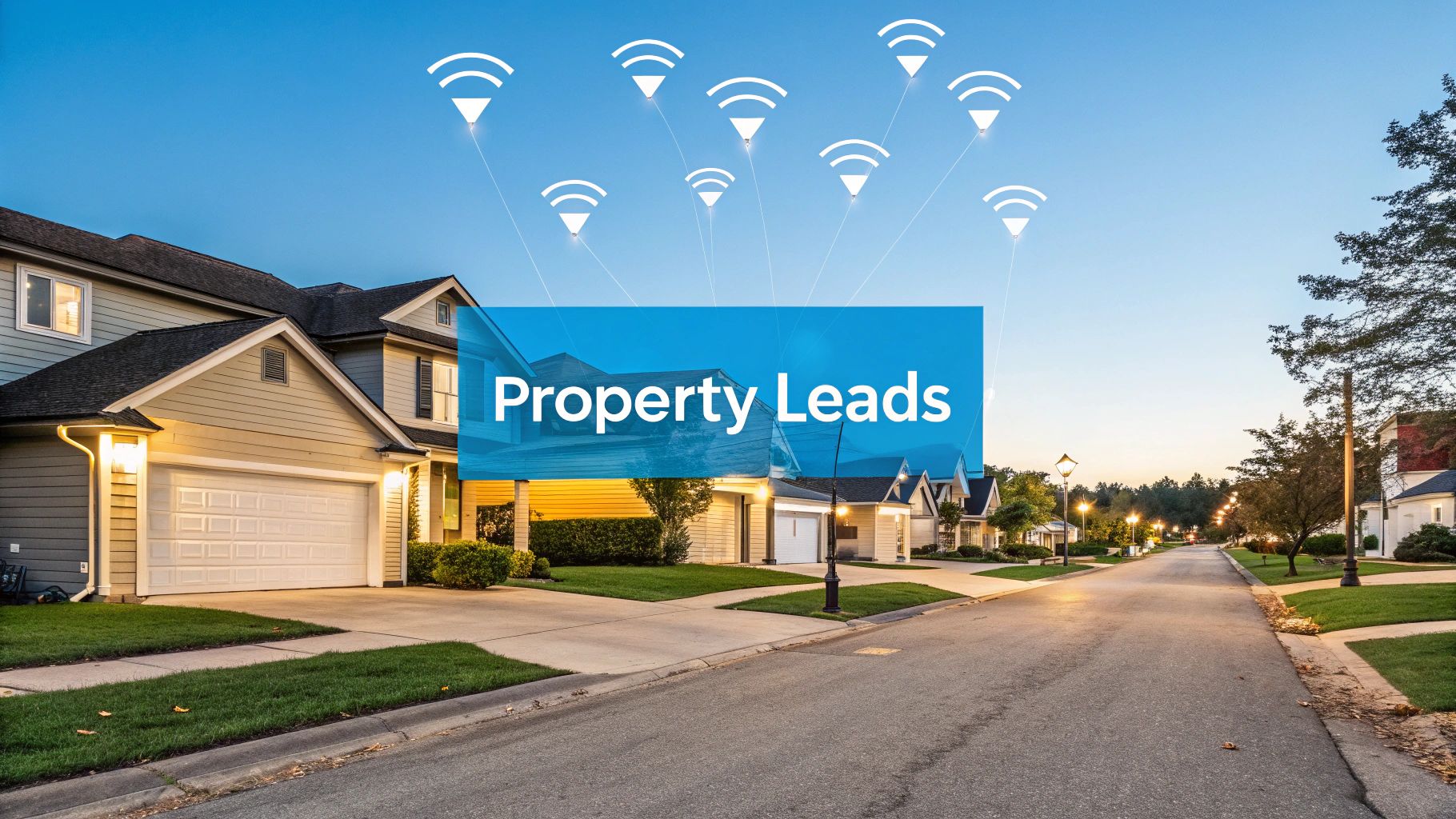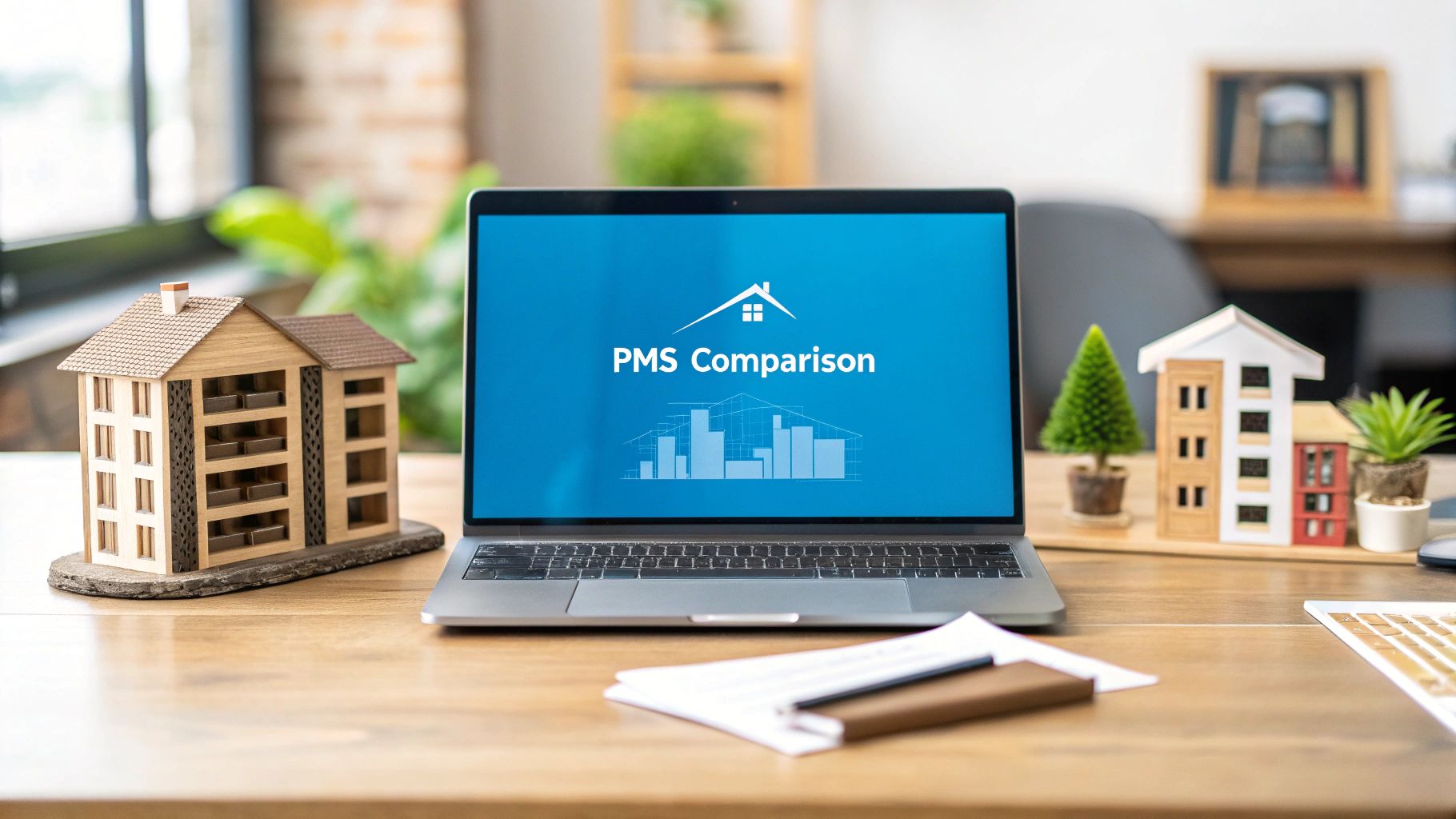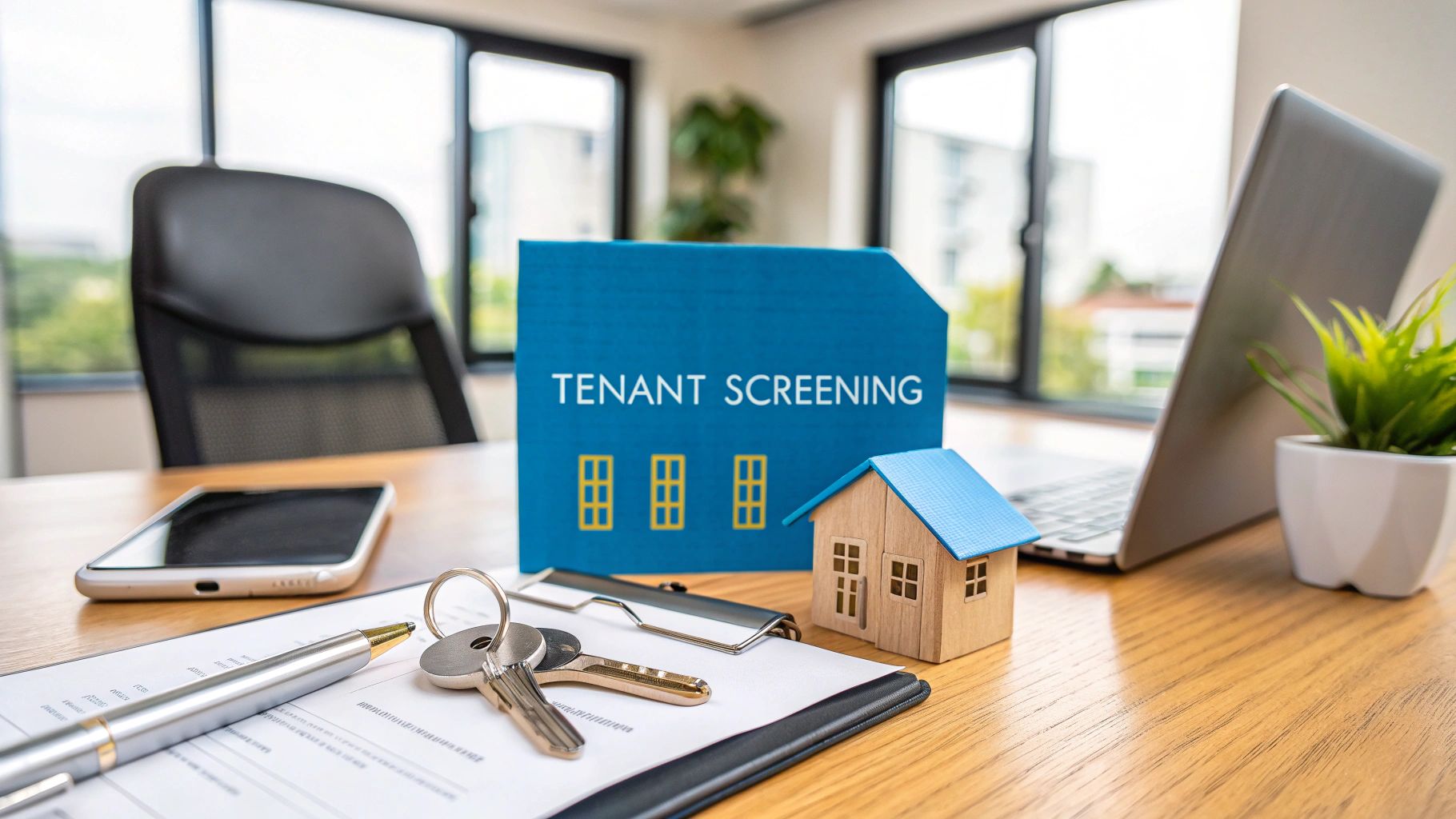For large-scale property management companies, sustainable growth hinges on a consistent, high-quality stream of new owner leads. Managing portfolios of 1,000 to 10,000+ units demands more than just operational efficiency; it requires a sophisticated, multi-channel lead generation engine that performs predictably at scale. In an industry where cost-per-door and vacancy rates directly impact revenue, mastering the acquisition of property management leads is not a luxury, it's a core business function.
This article moves beyond generic advice to provide a blueprint for enterprise-level lead generation. We will dissect eight proven strategies designed specifically for KPI-driven operations teams focused on portfolio expansion. Each section offers actionable frameworks, practical implementation details, and insights tailored for multi-market operations. You will learn how to build a diversified and resilient lead pipeline that consistently attracts high-value property owners, enabling you to focus on what you do best: managing assets and maximizing returns.
From dominating local search results to building strategic referral networks, these methods are engineered to help you secure your next 1,000 doors. The goal is to create a predictable system that fuels your growth, reduces owner acquisition costs, and solidifies your market position. Let's explore the strategies that top-tier property management companies use to build and maintain their competitive edge.
1. Local Search Engine Optimization (SEO) & Google My Business
For property managers managing large, distributed portfolios, mastering local search is a non-negotiable strategy for generating high-intent property management leads. When a property owner needs management services, their first step is often a Google search like "property management in [city]" or "best rental managers near me." Local Search Engine Optimization (SEO) is the process of ensuring your company appears prominently in these crucial search results, especially in the coveted "map pack" section.

At its core, local SEO signals to search engines that your business is a relevant, authoritative, and trustworthy solution for a specific geographic area. For multi-market operators, this means creating a distinct and optimized presence for each location you serve. The cornerstone of this strategy is your Google Business Profile (formerly Google My Business), which acts as a digital storefront, providing owners with a direct path to contact you.
Why It's Critical for Lead Generation
A strong local SEO presence directly impacts your bottom line by capturing "hand-raiser" leads, individuals actively seeking your services. This approach is highly efficient because it targets owners at their exact moment of need, reducing acquisition costs compared to broader marketing efforts. For instance, Real Property Management franchises successfully leverage standardized local SEO strategies across over 300 locations to maintain consistent lead flow in diverse markets. Similarly, a 2023 study by BrightLocal found that 87% of consumers used Google to find local businesses, highlighting its foundational role. This is a foundational element of any effective property management marketing plan.
Actionable Implementation Steps
- Claim and Optimize Every Location: Create and fully optimize a unique Google Business Profile for each physical office or distinct market you serve. Consistency is key. To enhance your local online presence and attract more leads, consider best practices for perfecting your Google Business Profile.
- Maintain NAP Consistency: Ensure your company's Name, Address, and Phone number (NAP) are identical across your website, Google profiles, and all other online directories like Yelp and Angi.
- Develop Location-Specific Content: Create dedicated pages on your website for each city or major neighborhood you manage. Detail your services for that specific area and include local keywords, such as "single-family property manager in [City Name]."
- Systematize Your Review Process: Actively solicit reviews from satisfied property owner clients. Positive Google reviews are one of the most powerful ranking factors for local search and build immediate trust with prospective leads.
2. Pay-Per-Click (PPC) Advertising on Google Ads
While SEO builds a long-term organic presence, Pay-Per-Click (PPC) advertising on platforms like Google Ads offers immediate and highly targeted visibility. This strategy allows property management companies to place ads at the very top of search results for specific, high-intent keywords such as "property manager for single-family homes" or "rental management company fees." You pay only when a prospective owner clicks on your ad, making it a direct and measurable way to generate property management leads.
For large-scale operators managing distributed portfolios, PPC is a powerful tool for entering new markets or quickly increasing lead flow during peak seasons. By bidding on geographically-specific keywords, you can instantly establish a presence and capture the attention of property owners actively searching for management services, bypassing the longer ramp-up time required for organic SEO efforts to mature.
Why It's Critical for Lead Generation
PPC advertising provides unparalleled control and speed in lead generation. It allows you to target owners by location, demographic, and search intent with surgical precision. This is essential for companies looking to scale rapidly or test messaging in different markets without significant upfront investment in other marketing channels. According to WordStream, the average return on investment for Google Ads is $2 for every $1 spent across all industries. A well-optimized campaign focused on high-value property management leads can often exceed this benchmark, delivering significant returns by attracting motivated property owners.
Actionable Implementation Steps
- Create Geo-Targeted Campaigns: Develop separate ad campaigns for each city or major metropolitan area you serve. This allows you to tailor ad copy and landing pages with local messaging, increasing relevance and conversion rates.
- Utilize Negative Keywords: Build a comprehensive list of negative keywords (e.g., "jobs," "apartments for rent," "tenant portal") to filter out irrelevant clicks from renters or job seekers, ensuring your budget is spent only on attracting property owners.
- Develop High-Conversion Landing Pages: Do not send PPC traffic to your homepage. Create dedicated landing pages specifically for your ads that feature a clear value proposition, social proof like owner testimonials, and a simple lead capture form.
- Implement Conversion Tracking: Set up conversion tracking for both form submissions and phone calls. This provides crucial data on which keywords and ads are driving actual business, allowing you to optimize your campaigns for maximum ROI.
- Launch Remarketing Campaigns: Target website visitors who did not fill out a form on their first visit. By showing them follow-up ads as they browse other sites, you can stay top-of-mind and bring them back to convert into a lead.
3. Content Marketing & Educational Blogging
Content marketing is a strategic approach to generating high-quality property management leads by creating and distributing valuable, relevant, and consistent content. Instead of directly pitching your services, you attract property owners by educating them on topics they care about, such as rental investment strategies, tenant screening, and market trends. This process establishes your company as a trusted authority and the go-to expert in your market.

At its core, educational blogging positions your company as a solution provider rather than just a service vendor. When a property owner searches for "how to handle a difficult tenant" or "best rental upgrades for ROI," your insightful blog post provides the answer. This builds an initial layer of trust and keeps your brand top-of-mind for when they eventually decide to hire a professional manager, creating a pipeline of warm, informed leads.
Why It's Critical for Lead Generation
Content marketing excels at capturing owners at the top and middle of the sales funnel, nurturing them long before they are ready to sign a contract. This long-term strategy generates compounding returns; a single well-written blog post can attract organic traffic and leads for years. For example, Buildium's industry-leading blog generates over 100,000 monthly visitors by consistently publishing high-value content for property managers and owners. Similarly, Mynd Property Management found that its investor education content converted leads at a 25% higher rate than other channels because the prospects were already educated and engaged.
Actionable Implementation Steps
- Identify Owner Pain Points: Brainstorm and research topics that property owners in your target markets frequently search for. Focus on practical problems like "how to screen tenants legally," "rental market analysis for [Your City]," or "maintenance cost reduction tips."
- Create Comprehensive Guides: Develop in-depth, "pillar" content on major topics. These comprehensive guides can be gated with a simple form (e.g., "Download our Ultimate Tenant Screening Checklist") to capture email addresses and generate property management leads.
- Leverage Local Market Data: Differentiate your content by publishing location-specific articles. Create posts like "Q3 2024 Rental Market Report for [City Name]" or "Top 5 Landlord-Friendly Neighborhoods in [Your County]" to attract high-intent local owners. Beyond just blogging, exploring various content marketing strategy examples can diversify your approach and reach a wider audience.
- Repurpose and Distribute: Maximize the reach of every article. Turn a blog post into a series of social media tips, a video script, or an email newsletter. This ensures your valuable content is seen across multiple platforms where potential clients spend their time.
4. Referral Programs & Partner Networks
Systematizing word-of-mouth marketing is one of the most cost-effective ways for large-scale property management companies to generate a predictable stream of high-quality property management leads. Referral programs and strategic partner networks transform satisfied clients and professional contacts into a proactive, external sales force. This approach leverages trusted relationships with real estate agents, contractors, and existing owners to bring in new business with built-in credibility.

At its core, a formalized referral strategy moves beyond occasionally asking for introductions. It involves creating a structured program with clear incentives, communication channels, and tracking mechanisms. For property managers operating across multiple markets, this system provides a scalable and repeatable method for lead generation that complements digital marketing efforts by tapping into established local networks.
Why It's Critical for Lead Generation
Referral leads are inherently warmer and convert at a significantly higher rate than cold leads. They come pre-vetted with a level of trust, which shortens the sales cycle and reduces client acquisition costs. For example, Renters Warehouse famously generates as much as 50% of its new business through client referrals and strategic partnerships. Similarly, JWB Real Estate Capital built a powerful lead engine by cultivating a network of over 500 referring real estate agents. These programs are essential for diversifying your lead sources and building a resilient business that isn't overly reliant on any single channel.
Actionable Implementation Steps
- Offer Meaningful Incentives: Generic gift cards are not enough. Provide a significant financial reward, such as $500 to $1,000 for each successful new management agreement. This substantial incentive motivates partners to actively send business your way.
- Create a Formal Real Estate Agent Program: Don't just network; build a structured partner program. Provide agents with co-branded marketing materials, training on your services, and a dedicated portal to submit and track referrals. This professionalizes the relationship and ensures consistency.
- Expand Your Partner Network: Look beyond real estate agents. Develop formal referral relationships with property inspectors, contractors, real estate attorneys, and mortgage brokers. These professionals frequently encounter property owners in need of management services.
- Systematize Tracking and Follow-Up: Use your CRM to track every referral's source, status, and payout. Automate follow-up emails to both the lead and the referring partner to keep everyone informed and ensure no opportunity is missed.
- Host Appreciation Events: Acknowledge and reward your top referral sources. Hosting exclusive annual or quarterly events for your best partners strengthens relationships and reinforces the value of your program. This systematic approach is just one of many strategies that, like those explored in our guide on how to lease properties quicker and cheaper, contributes to overall portfolio efficiency.
5. Social Media Marketing & Facebook Lead Generation
For property management companies aiming to scale, social media marketing has evolved from a simple branding tool into a powerful engine for generating high-quality property management leads. Platforms like Facebook, Instagram, and LinkedIn allow you to precisely target property owners and real estate investors in your specific service areas, building both brand awareness and a direct pipeline of new management contracts. This strategy moves beyond passive content posting and into active, data-driven lead generation.
At its core, a social media lead strategy involves using a mix of organic content and targeted paid advertising to connect with your ideal clients. By sharing valuable insights, success stories, and compelling offers, you can capture the attention of property owners before they even begin actively searching for a manager. For property managers, this means building a community, establishing authority, and using sophisticated ad tools to find and convert leads directly within the platform.
Why It's Critical for Lead Generation
Social media’s strength lies in its sophisticated targeting capabilities, allowing you to reach specific demographics like homeowners aged 35-65 or individuals interested in real estate investing within a defined geographic radius. This precision ensures your marketing budget is spent efficiently, placing your message directly in front of potential clients. For example, Steadily Property Management reportedly generated over 200 leads per month by leveraging Facebook Lead Ads with a free rental analysis offer. Similarly, Green Residential significantly increased its brand visibility among Houston-area property owners through targeted social campaigns. It's an essential component for any modern lead generation effort, complementing inbound strategies like SEO.
Actionable Implementation Steps
- Utilize Facebook Lead Ads: Create targeted advertising campaigns using Facebook's Lead Ad format. This allows users to submit their contact information without ever leaving the platform, dramatically increasing conversion rates. Promote compelling offers like a free property evaluation or a guide to maximizing rental income.
- Target Hyper-Locally: Define your ad audiences with precision. Target homeowners by zip code, age, and interests that indicate property ownership or investment activity. This ensures your ads are seen by the most relevant local prospects.
- Engage in Local Groups: Join and actively participate in local real estate investor and community Facebook Groups. Provide genuine value by answering questions and sharing expertise, not just promoting your services. This builds trust and positions you as the local authority.
- Showcase Your Value with Visuals: Create and share video content, client testimonials, and before-and-after photos of properties you've improved. Visual proof of your success is highly persuasive and helps potential property management leads envision the value you provide.
6. Direct Mail & Targeted Print Marketing
In an era dominated by digital noise, a well-executed direct mail campaign can cut through the clutter to generate high-value property management leads. This traditional marketing strategy involves sending targeted, physical marketing materials directly to the mailboxes of property owners. By leveraging specific data sets, property managers can pinpoint ideal prospects, such as absentee owners or those in specific geographic areas, with personalized messaging about their services.
While it may seem old-fashioned, direct mail offers a tangible connection that digital ads cannot replicate. For property managers, it’s a powerful tool for hyper-local targeting and reaching owners who may not be actively searching online. The key to success lies in combining precise list acquisition with a compelling, professional presentation that stands out and prompts action.
Why It's Critical for Lead Generation
Direct mail's primary strength is its ability to proactively target and engage specific owner profiles with a high degree of accuracy. Unlike inbound strategies that wait for owners to search, this approach initiates the conversation, making it invaluable for market expansion and competitive positioning. For instance, FirstService Residential attributed a significant portfolio increase to targeted direct mail campaigns aimed at specific condominium associations. Similarly, many Real Property Management franchises consistently use direct mail to connect with absentee owners identified through public records, a tactic that reliably produces new management contracts.
Actionable Implementation Steps
- Target Absentee and Out-of-State Owners: Use data providers like ListSource or public county property records to acquire mailing lists of non-owner-occupied properties. These individuals are prime candidates for professional management services.
- Design a High-Impact Postcard: Use bright, professional postcards that are concise and visually appealing. Focus on a single, compelling message and a clear call-to-action (CTA).
- Include a Compelling, Trackable Offer: Drive responses by offering a free rental market analysis, a waiver of the first month's management fee, or a comprehensive property assessment. Use a unique phone number or a dedicated landing page URL to accurately track the campaign's ROI.
- Integrate with Digital Retargeting: Use your mailing list to create a custom audience for digital ad campaigns on platforms like Facebook or Google. This multi-channel follow-up significantly increases brand recall and conversion rates for your property management leads.
7. Email Marketing & Lead Nurturing Campaigns
While many marketing strategies focus on capturing new attention, email marketing is designed to cultivate the interest you’ve already earned. It is a systematic approach to building and maintaining relationships with potential property management clients through targeted email communications. This strategy moves beyond one-off messages, creating valuable content sequences that educate prospects, build trust, and guide them toward choosing your services when the time is right.
For property managers with long sales cycles, email nurturing is the bridge between initial interest and a signed management agreement. It keeps your brand top-of-mind, positioning you as an industry authority so that when a property owner is finally ready to hire a manager, your company is their first and only choice. By delivering consistent value directly to their inbox, you transform cold inquiries into warm, qualified property management leads.
Why It's Critical for Lead Generation
Email marketing provides a direct and cost-effective line of communication to your prospects, yielding one of the highest ROIs in digital marketing. For large-scale operators, it’s an essential tool for segmenting and nurturing leads across diverse markets and owner profiles. According to HubSpot's 2024 State of Marketing report, 77% of marketers have seen an increase in email engagement over the last 12 months, reaffirming its power. Similarly, Buildium's popular property management newsletter reaches over 50,000 subscribers, consistently generating high-quality inbound leads by offering valuable industry insights.
Actionable Implementation Steps
- Segment Your Audience Lists: Don't send the same message to everyone. Group your contacts by property type (SFR, small multifamily), geographic location, or investor experience level (e.g., first-time landlord vs. portfolio owner) to deliver highly relevant content.
- Create High-Value Content: Develop a content calendar focused on solving owner pain points. Offer local market updates, rental data analysis, maintenance tips, and legal updates. The goal is to educate, not just sell.
- Leverage Automation for Nurturing: Use a platform like HubSpot or Mailchimp to create automated "drip" campaigns. A new lead could receive a welcome series that introduces your company, followed by educational emails over several weeks. Explore how marketing automation can enhance your tech stack for more efficient lead nurturing.
- Optimize and Test: Continuously A/B test your subject lines, calls-to-action (CTAs), and sending times to improve open and click-through rates. Ensure every email has a clear next step, like "Book a Free Rental Analysis" or "Download Our Owner Guide."
8. Networking & Industry Event Marketing
While digital strategies are essential, old-fashioned, in-person networking remains a potent channel for generating high-value property management leads. This relationship-building strategy focuses on attending, sponsoring, and hosting real estate investment events, property management conferences, and local business meetings. The goal is to connect directly with property owners and influential industry professionals who can provide a steady stream of qualified referrals.
For property managers operating at scale, networking isn't just about shaking hands; it's about establishing your company as the authoritative management expert in a given market. By strategically positioning your team at the center of the local investment community, you build a powerful, long-term lead generation engine that is difficult for competitors to replicate. This approach turns industry peers into a proactive, external sales force.
Why It's Critical for Lead Generation
Networking directly targets individuals already deeply involved in real estate, significantly shortening the sales cycle. These are not cold leads; they are investors, agents, and vendors who understand the value of professional management and are actively seeking trusted partners. This direct engagement builds immediate credibility. For example, many Real Property Management franchisees generate over 30% of their new business through active participation in local Real Estate Investor Association (REIA) meetings. Similarly, Mynd Property Management ensures its executives are visible, speaking at over 50 real estate events annually to attract large portfolio owners.
Actionable Implementation Steps
- Target Real Estate Investor Associations (REIAs): Identify and consistently attend the REIA meetings in every market you serve. These venues are concentrated hubs of your ideal clients: active property investors.
- Offer to Speak or Host Panels: Position your company as a thought leader by offering to present on property management topics at investor meetups. Discussing tenant screening, maintenance efficiency at scale, or maximizing rental ROI establishes your expertise and generates inbound inquiries.
- Sponsor Local Real Estate Events: Increase brand visibility and demonstrate commitment to the local market by sponsoring key events. This provides premium access to attendees and positions your company as a market leader.
- Host Educational Workshops: Host your own workshops focused on rental property investing, market analysis, or using technology to scale a portfolio. This tactic attracts new and experienced investors, creating a direct pipeline of property management leads.
- Implement a Rapid Follow-up System: Use a CRM to track every connection made at an event. Ensure your team follows up with a personalized email or call within 24 hours to keep the momentum going and schedule a formal discussion about their management needs.
Property Management Leads Strategies Comparison
From Leads to Leases: Integrating Your Growth and Operations
Generating a steady stream of property management leads is the fuel for growth, but it’s the engine of your operations that determines how far and how fast your company can go. As we've explored, strategies from hyper-targeted local SEO and PPC campaigns to sophisticated content marketing and referral networks all serve to fill the top of your funnel. However, for enterprise-level operators managing hundreds or thousands of distributed units, lead volume alone is a vanity metric. The real measure of success is the efficiency with which you convert those leads into signed leases.
The critical takeaway is that your marketing and operational strategies cannot exist in separate silos. An aggressive PPC campaign that drives a surge of tenant inquiries is wasted if your team can't schedule tours within minutes. A brilliant referral program falls flat if the new property owner leads experience a slow, disjointed onboarding process. Each lead generation tactic discussed in this article, from digital advertising to direct mail, must be supported by a scalable, technology-driven backend designed to handle increased volume without a proportional increase in overhead.
Your Actionable Blueprint for Scalable Growth
Mastering the acquisition of property management leads is about creating a system, not just running a campaign. It’s about building a predictable growth engine that feeds a highly efficient leasing machine. As you move forward, focus on these core principles to turn the insights from this article into measurable results:
- Integrate and Automate: Connect your lead sources directly to your CRM and leasing management software. Eliminate manual data entry and create automated workflows that trigger instant responses to new inquiries. The goal is to shrink the time from lead capture to first contact to mere seconds.
- Measure What Matters: Shift your focus from lead quantity to conversion velocity. Track key performance indicators like lead-to-tour conversion rates, cost per tour, and, most importantly, Days on Market (DOM). Reducing DOM by even a few days across a large portfolio translates directly to significant revenue recovery.
- Prioritize Speed-to-Lease: In today's competitive rental market, speed is the ultimate differentiator. Implement systems that enable same-day showings and instant responses. The first property manager to get a qualified prospect through the door is often the one who gets the application.
Ultimately, building a powerful lead generation pipeline is about more than just marketing; it’s about architecting a seamless journey from prospect to resident. By aligning your lead acquisition strategies with a robust, tech-enabled operational framework, you move beyond simply collecting contacts. You begin to systematically dominate your market, optimize your cost per door, and build a truly scalable, remote-first property management enterprise that is built for the future. The strategies are here, the technology is available, and the opportunity to outpace your competition has never been greater.
Ready to transform your lead conversion process and dramatically reduce your Days on Market? Showdigs provides an on-demand, tech-enabled solution for showings, enabling you to convert more property management leads into leases faster than ever before. Learn how our platform helps enterprise-level operators scale their leasing operations and maximize portfolio revenue.







